Texas-Style Chili Without Beans: A Spicy Symphony of Flavor (No Legumes Required!)
If you're looking to whip up a pot of authentic Texas chili — or as they like to call it, “real chili” — then brace yourself for a meaty, smoky, spicy explosion of flavor. This is not your average bean-laden bowl from Cincinnati or Ohio; this is pure cowboy cuisine, where beans are strictly not welcome.
In this article, we’ll walk you through everything you need to make a classic recipe for Texas chili no beans, including tips, tricks, spice substitutions, and even a few chuckles along the way. So grab your Dutch oven, roll up your sleeves, and let’s get spicy.
Contents
- Why No Beans in Texas Chili?
- Key Ingredients for Texas-Style Chili
- Spice Blend Breakdown
- Step-by-Step Recipe Guide
- Pro Tips for the Best Batch
- Serving Suggestions & Traditions
- Common Variations & Regional Rivalries
- Chili con Carne vs. Texas Red
- Visual Comparison Table
- Frequently Asked Questions
- Final Thoughts
Why No Beans in Texas Chili? 🤔
In Texas, chili isn’t just food — it’s culture. And in that culture, beans are considered a culinary crime when making chili con carne. But why?
- Traditionally, Texas chili was made by cowboys who needed something hearty, portable, and long-lasting on cattle drives.
- Beans were harder to store and cook without proper equipment, so they were skipped.
- Over time, the style became an identity — real Texas chili is all about the meat and the spice.
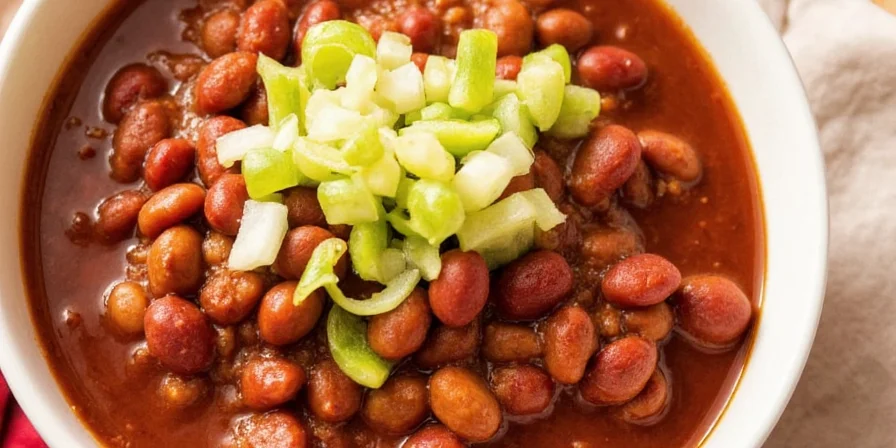
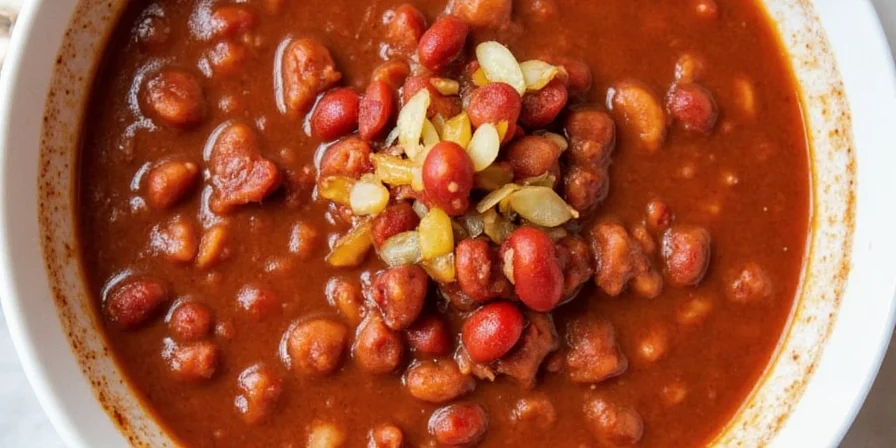
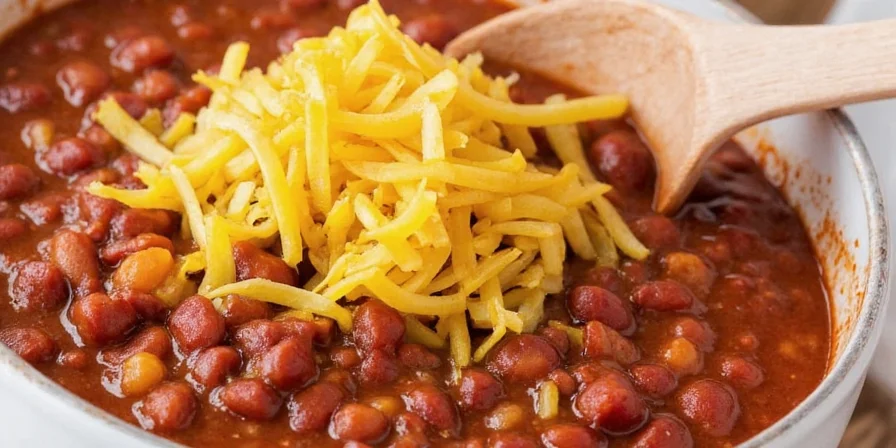
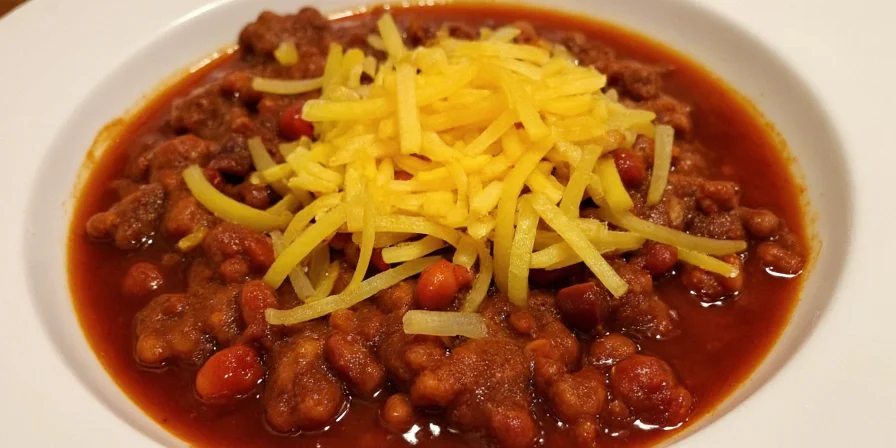
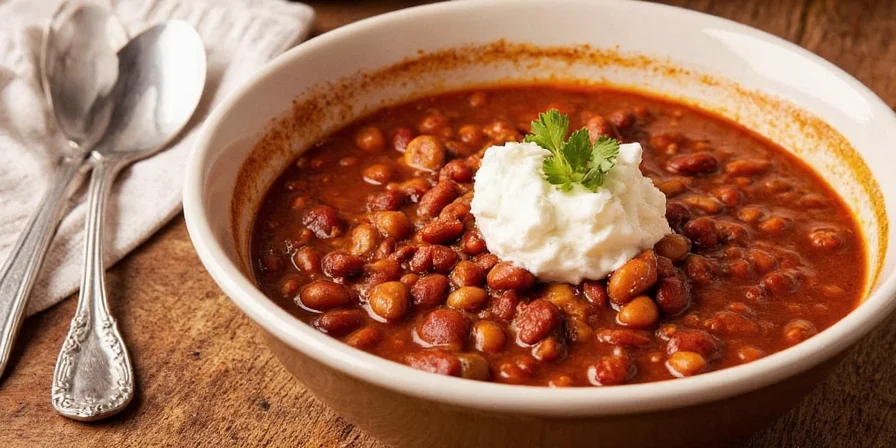
Key Ingredients for Texas-Style Chili
To keep it traditional yet flavorful, here's what you'll need:
- Beef chuck or brisket: Cubed for slow cooking and melting tenderness.
- Chili powder blend: The soul of the dish. More on that later!
- Onion and garlic: For aromatic depth.
- Beef broth or stock: To build the liquid base.
- Tomato paste or crushed tomatoes: Adds body and acidity balance.
- Lard or oil: For searing meat and blooming spices.
- Optional**: Worcestershire sauce, coffee, vinegar, or molasses for complexity.
Spice Blend Breakdown
The spice mix is what sets Texas chili apart from any other stew or chili out there. Here's a classic dry rub/spice blend:
| Ingredient | Quantity | Role in Flavor Profile |
|---|---|---|
| Chili powder (New Mexico or Ancho preferred) | 3 tbsp | Basis of heat and earthiness |
| Ground cumin | 1 tbsp | Smoky warmth |
| Paprika (sweet or smoked) | 1 tsp | Color and subtle sweetness |
| Oregano (Mexican if available) | 1 tsp | Herbal bite |
| Cayenne pepper | ½ tsp | Kick of heat (adjust to taste) |
| Black pepper | ½ tsp | Depth and bite |
Step-by-Step Recipe Guide
- Sear the Beef: Brown cubes of beef in batches to develop a nice crust. Set aside.
- Sauté Aromatics: Cook onions and garlic until soft and fragrant.
- Bloom the Spices: Add the spice blend and toast for about 1 minute until fragrant.
- Add Tomato Base: Stir in tomato paste or crushed tomatoes and cook until darkened slightly.
- Simmer Time: Return the beef, add broth or water to desired consistency, and let it simmer low and slow for 2–3 hours.
- Taste & Adjust: Taste and tweak seasonings — maybe add a splash of vinegar or a pinch of sugar if needed.
- Rest Overnight: Letting it sit enhances the flavor.
Pro Tips for the Best Batch
- Don’t rush the bloom: Toasting the spices properly unlocks their full potential.
- Use a heavy-bottomed pot: Like a Dutch oven or cast iron for even heat distribution.
- Low and slow wins the race: Simmering over low heat ensures tender meat and deep flavors.
- Season early and often: Salt each layer — meat, onions, final product.
- Coffee for complexity: Some pitmasters swear by adding a cup of brewed coffee for deeper richness.
- Dare to deglaze: Scrape up those brown bits after searing for extra umami.
Serving Suggestions & Traditions
In Texas, presentation matters. Here’s how to serve it right:
- Traditional bowl with oyster crackers: The original way to enjoy.
- With cornbread: Either as a side or crumbled into the chili (“chili pie” style).
- Top with cheese or onions: If you’re not going fully purist.
- Chili con queso side: For the ultimate Tex-Mex combo.
Common Variations & Regional Rivalries
While Texas stands firm on its no-bean stance, other regions have gone rogue:
- Cincinnati chili: Served over spaghetti with cheese — controversial but tasty.
- New Mexico chili: Uses fresh chilies and more heat than heart.
- Midwest chili: Often includes kidney beans and is milder in flavor.
- Texan variations: Some folks add chocolate or cinnamon for depth — yes, really!
Visual Comparison Table
| Region | Beans Included? | Meat Type | Spice Level | Unique Ingredient |
|---|---|---|---|---|
| Texas | No | Chuck or Brisket | Moderate to High | Coffee or Molasses |
| Cincinnati | Yes | Ground Beef | Mild | Cinnamon |
| New Mexico | Optional | Pork or Venison | High | Fresh Green Chiles |
| Mexico | Optional | Beef or Pork | Varies | Chocolate |
Frequently Asked Questions
Can I use ground beef instead of cubed beef?
Absolutely! It’s more common in modern home kitchens and still delicious. Just don’t tell a true-blue Texan.
How do I adjust the heat level?
Use less cayenne or substitute some chili powder with a milder version. You can also add a bit of dairy or sugar at the end to tame the flames.
Is it possible to make this in a slow cooker?
You betcha! Brown the meat first, then throw everything into the slow cooker and let it go on low for 6–8 hours.
What’s the best way to store leftover chili?
It keeps well in the fridge for up to 5 days and freezes beautifully for up to 3 months. In fact, it tastes better the next day!
Final Thoughts: The Heart of Texas in a Bowl
There’s nothing quite like a steaming bowl of Texas-style chili without beans — bold, meaty, and deeply spiced. Whether you're cooking over a campfire or simmering on the stovetop, this dish carries with it generations of tradition, cowboy grit, and a whole lot of soul.
So go ahead — skip the beans, crank up the heat, and impress your friends with your newfound mastery of one of America’s most iconic dishes. And remember, in Texas, beans aren’t just optional… they’re forbidden.
Happy cooking, and may your chili always be spicy and your company hungry! 🌶️🤠

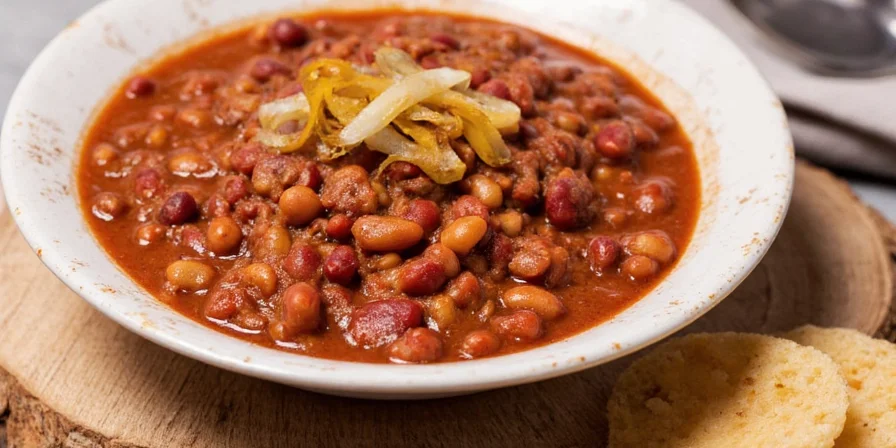









 浙公网安备
33010002000092号
浙公网安备
33010002000092号 浙B2-20120091-4
浙B2-20120091-4